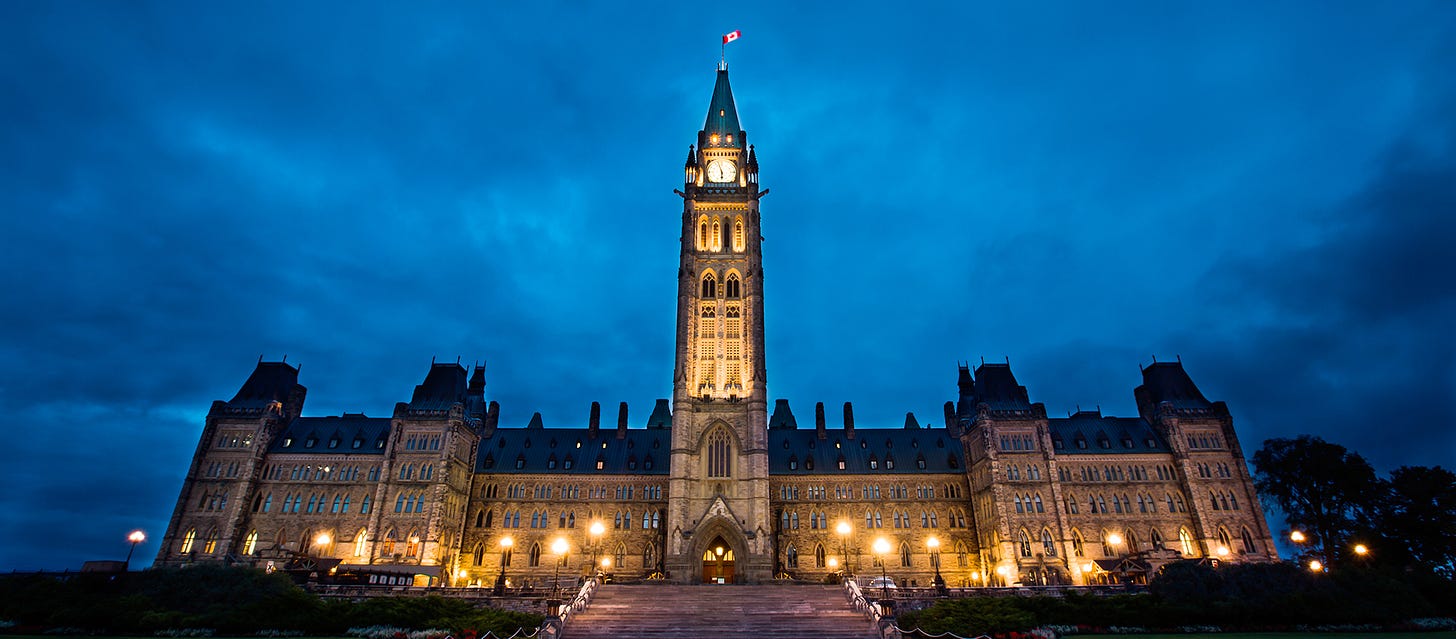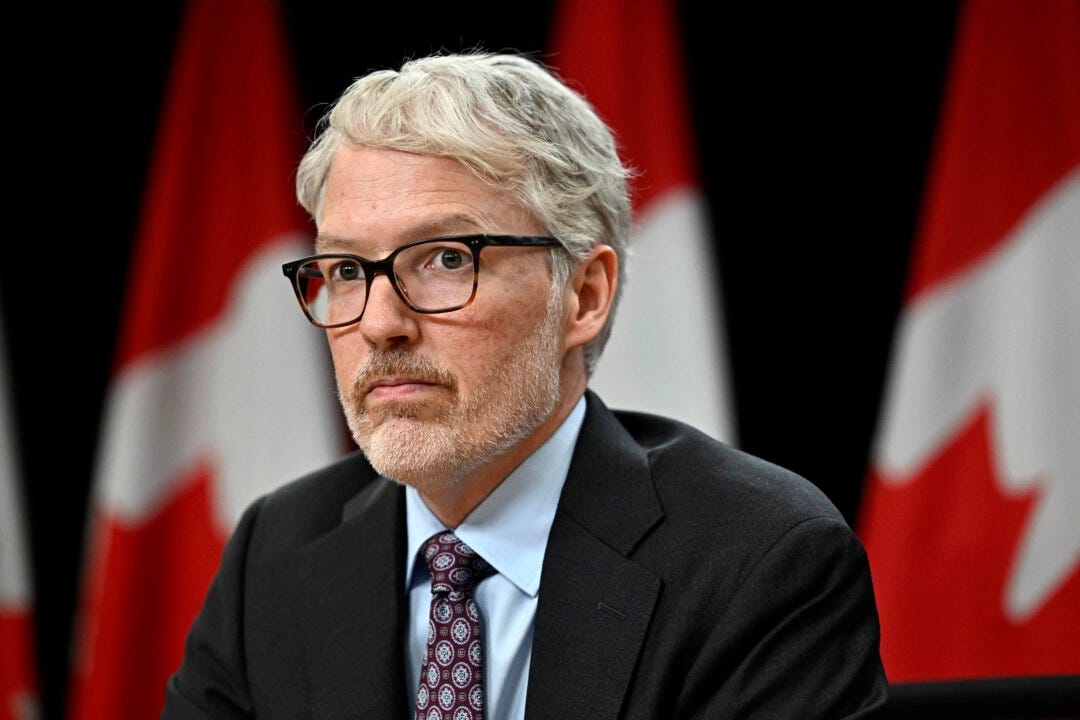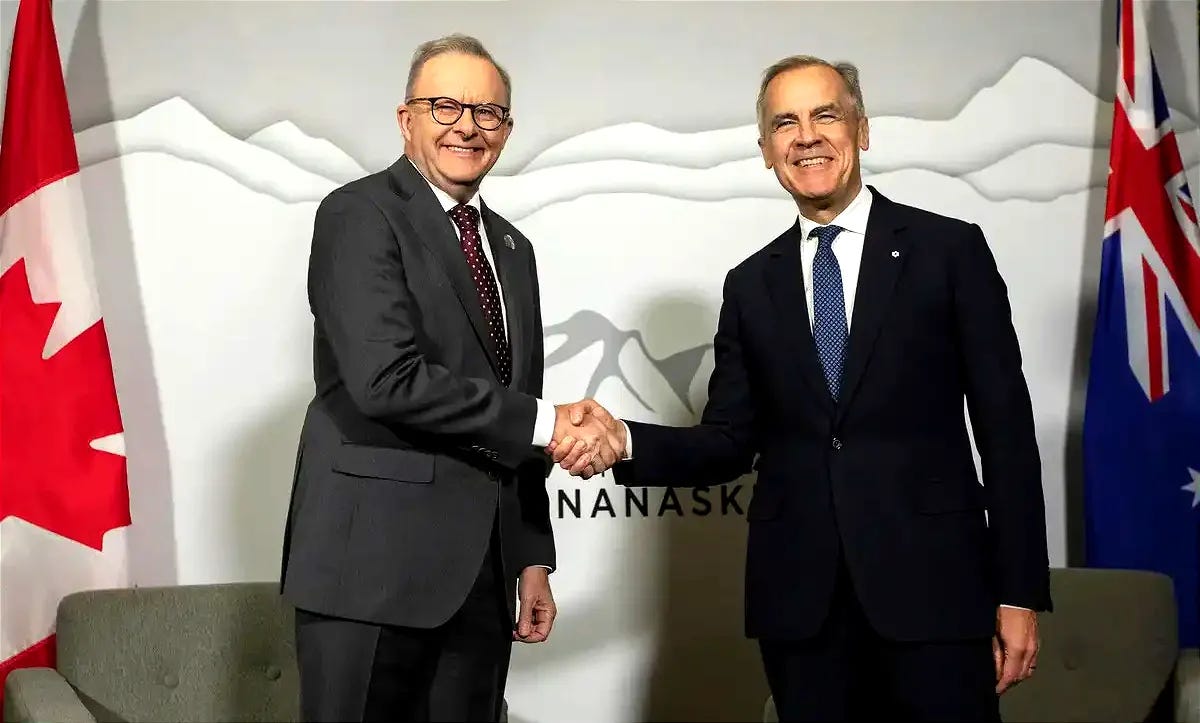Good morning, it’s Tuesday, October 14th. In today’s news, Hate laws and spy powers are replacing justice and accountability, Conservatives move to end the billion-dollar DEI bureaucracy, Fred Hahn ousted as CUPE turns on its own activist leadership, All 20 surviving Israeli hostages freed and over 1,900 Palestinian prisoners released, and much more.
First time reading the daily blend? Sign up here.
Hate Laws and Spy Powers Are Replacing Justice and Accountability
While Canadians struggle with inflation, rising crime, and a collapsing sense of safety and order, the federal government’s legislative agenda tells a different story — one that says more about its priorities than its rhetoric ever could. Of the first bills introduced this session, none meaningfully address the issues ordinary Canadians are most concerned about: violent crime, theft, economic stagnation, or restoring public trust in justice. Instead, Ottawa’s focus seems fixed on expanding its own control — over speech, information, and the flow of data.
Look no further than the bills themselves. The so-called Strong Borders Act (C-2) and Cybersecurity Act (C-8) sound reassuring on the surface, but both embed sweeping new powers for government agencies to monitor communications and direct telecommunications companies at will. The Combatting Hate Act (C-9), under the banner of protecting communities, pushes deeper into the territory of policing thought and emotion — criminalizing symbols and speech that bureaucrats deem hateful, with definitions so broad they could silence ordinary political dissent.
Yet while the government finds time to legislate over “hate,” “digital safety,” and “border data integrity,” there’s no serious movement to restore order to a justice system that’s clearly broken. Judges continue reducing sentences for violent offenders based on race or background, invoking “colonial trauma” as mitigation. Police forces are under-resourced. Car theft and violent assaults are skyrocketing. Ordinary Canadians are less safe every year — not because the state lacks power, but because it refuses to use that power where it matters.
If Ottawa were truly serious about protecting Canadians, its first legislative act would be to reform the Criminal Code — to end identity-based sentencing, restore mandatory minimums for violent crimes, and ensure that punishment once again fits the act, not the ancestry of the offender. Instead, this government has made “hate” and “misinformation” its enemies, while treating actual criminals as victims.
What we’re witnessing isn’t governance — it’s control. A government obsessed with surveillance and censorship, while blind to the collapse of public safety and trust, is not protecting its citizens; it’s managing them. And in a free country, that’s the surest sign of decay.
Conservatives Move to End the Billion-Dollar DEI Bureaucracy—Once and for All
The Conservative Party is turning up the heat on Ottawa’s sprawling Diversity, Equity, and Inclusion (DEI) bureaucracy—a Liberal-era program critics say prioritizes identity over ability and drains over $1 billion a year from taxpayers’ pockets.
Conservative MP Neil Ho launched a petition this week calling for the complete elimination of DEI mandates in public sector hiring, promotions, and contracting, arguing that government institutions should return to a simple principle: merit over ideology. The petition, shared by thousands on X over Thanksgiving weekend, calls DEI “bloated,” “wasteful,” and “divisive,” resonating with Canadians frustrated by what they see as political correctness replacing competence in the public service.
The Conservatives’ message is clear — DEI has become a taxpayer-funded ideology, not a fairness policy. According to internal government figures, DEI administration now costs over $1.049 billion annually, covering layers of consultants, training programs, and bureaucratic offices that have done little to improve efficiency or unity. Instead, critics say, these initiatives have entrenched identity politics across federal institutions, rewarding background over merit and silencing dissent in academia and research funding.
“Canadians are facing the highest cost of living in decades,” the petition reads. “Yet this Liberal government is wasting billions on bureaucracy and ideological projects while everyday Canadians can’t pay their bills.”
Supporters say the move signals a long-overdue correction—an effort to end the culture of ideological hiring and tokenism that has spread through government departments, research institutions, and publicly funded organizations. They argue taxpayer dollars should go toward frontline services, not bureaucratic self-congratulation.
The proposal also targets federally funded research programs that tie grants to DEI metrics. Conservatives argue that by forcing universities and researchers to meet identity quotas, Ottawa is undermining academic freedom and punishing merit-based excellence.
If successful, the Conservative plan would roll back one of the largest ideological bureaucracies in modern Canadian history, redirecting funds toward essential services and putting competence back at the center of public service.
Fred Hahn Ousted as CUPE Turns on Its Own Activist Leadership
Fred Hahn’s removal from his national position at CUPE marks more than the downfall of a single leader—it exposes how deeply Canada’s largest unions have been captured by ideological activism. For years, CUPE Ontario has drifted from collective bargaining and workers’ rights toward political radicalism, social-justice campaigns, and foreign-policy crusades. Hahn’s ousting wasn’t just about his rhetoric—it was about what CUPE has become.
At this week’s CUPE National Convention, delegates voted to reject a resolution endorsing the Boycott, Divestment and Sanctions (BDS) movement and to strip Hahn of his vice-presidency. But the documents coming out of the convention reveal a far more troubling picture. Fewer than one in ten resolutions addressed bread-and-butter issues like wages, pensions, or working conditions. Roughly a third of the agenda was devoted to ideological or geopolitical issues—condemning capitalism, demanding Canada withdraw from NATO, and promoting “decolonial” activism. Another fifth focused on social-justice and identity-based causes, often framed in the jargon of intersectionality and systemic oppression.
This is not what organized labour was built for. Unfortunately, as postmodern and neo-Marxist ideas have taken root in academia and public institutions, unions like CUPE have absorbed their language wholesale. The result is a new kind of labour politics—one that replaces class solidarity with identity hierarchies and economic pragmatism with moral absolutism.
Under this model, the goal is no longer to secure better contracts or safer workplaces, but to advance an overarching ideological project. Every issue—from climate to gender to foreign policy—is filtered through the same moral lens of oppression and liberation. And in doing so, unions risk alienating the very people they exist to serve.
Hahn’s defiance and eventual removal symbolize a broader reckoning. Ordinary CUPE members, many of whom joined to protect their livelihoods, are waking up to the fact that their dues are funding political activism that does little to improve their daily lives. The movement is collapsing under its own self-righteous weight.
CUPE can continue down this ideological path, or it can return to what once made the labour movement powerful—fighting for workers, not worldviews. Hahn’s firing may be the first sign that members have finally had enough. Source.
All 20 Surviving Israeli Hostages Freed, Over 1,900 Palestinian Prisoners Released
As part of a US-brokered ceasefire, all 20 remaining living hostages in Gaza were returned to Israel, while Israel released over 1,900 Palestinian prisoners, including 250 serving life sentences and more than 1,700 held without charge. Emotional reunions took place across Tel Aviv, Gaza, and the West Bank, with cheering crowds greeting buses of freed prisoners and hostages reuniting with families. Hamas also pledged to return the bodies of four of 28 deceased Israeli captives, though the timing for the rest remains uncertain.
The ceasefire ends two years of devastating war, which killed tens of thousands, displaced 90% of the Gazan population, and triggered regional tensions. US President Donald Trump addressed the Knesset in Israel and is attending a summit in Egypt with world leaders to discuss Gaza’s postwar governance, humanitarian aid, security arrangements, and the potential for a long-term Palestinian state. While the deal offers hope, key challenges remain, including Hamas disarmament, Israeli troop withdrawals, and who will govern Gaza. More
Privacy Commissioner Not Consulted on Bill Allowing Government to Block Internet Access
Bill C-8, the federal cybersecurity legislation, would give the Canadian government secret powers to block any individual from accessing internet or telecommunications networks without a warrant or public disclosure. Privacy Commissioner Philippe Dufresne warns the bill lacks safeguards for necessity, proportionality, and independent oversight, raising serious concerns about privacy and democratic rights. However, Dufresne was never consulted on this bill.
Why this is a huge red flag: By excluding the Privacy Commissioner from pre-legislation consultation, the government appears to be designing this law to operate in secret, giving itself the ability to restrict Canadians’ digital access in ways that could be misused or weaponized against individuals. More
The US Government Shutdown is Heading Towards a Third Week with No End in Sight - Repercussions of the shutdown are getting more serious, but so far, there’s no sign of a breakthrough, nor any serious talks between rival lawmakers on Capitol Hill. More
Afghanistan Killed 58 Pakistani Soldiers in Overnight Border Clashes as Tensions Escalate - Afghanistan said the soldiers were killed in response to what it called repeated violations of its territory and airspace. More
Netherlands Seizes Chinese-Owned Chipmaker Nexperia - Dutch authorities have frozen Nexperia’s operations, suspended its CEO, and placed the company under external management. The move is intended to safeguard Europe’s access to critical chips while preventing sensitive technology from being transferred to China. More
Elite Military Unit Defects as Coup Unfolds in Madagascar - Elite CAPSAT soldiers joined thousands of Gen Z protesters in Madagascar’s capital, refusing orders to fire on civilians and declaring military control. More
EU Launches Child Safety Probe Into Snapchat, YouTube, App Stores - If they are found in breach of the DSA’s child safety provisions, they could face fines up to 6% of their global annual revenue. More
Tennessee Authorities Confirm 16 Dead, No Survivors from Munitions Factory Explosion - More
Australia Pulls Back Controversial Tax on Unrealized Capital Gains—A Warning for Canada
Australia has rolled back its controversial plan to tax unrealized capital gains on superannuation, instead targeting only realized gains and introducing indexed thresholds for very high balances. Treasurer Jim Chalmers framed the move as a fairer, more manageable system that raises revenue from the ultra-wealthy while protecting middle- and low-income savers. The revision also delays implementation by a year and expands benefits for low-income earners, making it a more balanced approach overall. More
Why it’s important for Canada: Had Australia pushed through its original tax on unrealized gains, it would have set a precedent likely to influence Canadian policymakers and embolden similar proposals here. By pulling back, it serves as a stopgap example of restraint—highlighting the risks of overreaching taxation and underscoring the need for the federal government to stop penalizing Canadians with new, overly aggressive taxes.
Canada’s Postal Worker Union to Replace Nationwide Walkout with Rotating Strikes - More
Brookfield Backs Bloom Energy with $5 Billion for Fuel Cells to Power AI Data Centres - More
I think it’s important to track where Mark Carney’s private investments are going to understand how they may influence Canadian policy.
Crypto Experiences Largest Single-Day Sell-Off in History Following Trump’s 100% Tariff on All Chinese Goods - The announcement led to a massive $19.2 billion crypto market crash, described as the largest single-day liquidation in history, causing significant losses for traders. More
Apparently, Money Can Grow on Trees…Well, Gold Does
Scientists in Finland have discovered gold nanoparticles inside Norway spruce needles, revealing that microbes living within the trees may help form solid gold from dissolved particles in the soil. The study, led by researchers at the University of Oulu and the Geological Survey of Finland, is the first to link specific bacteria to gold formation inside plant tissues.
The finding could revolutionize eco-friendly mineral exploration, allowing geologists to detect underground gold deposits by analyzing tree microbiomes rather than drilling. Researchers believe similar microbe-driven chemistry could also help remove metals from mining-affected waters, offering a greener approach to both exploration and environmental cleanup. More
Nearest Advanced Civilization May Be 33,000 Light-Years Away and Millions of Years Older Than Us - More
Marking the End of an Era: MTV is Shutting Down Its Last Music Channels
Paramount Global is permanently shutting down the last five iconic MTV music channels—MTV Music, MTV 80s, MTV 90s, Club MTV, and MTV Live—by December 31, 2025, marking the end of an era in global music television. For over four decades, MTV helped shape pop culture, launch artists, and define generations through music videos. Fans say the loss of these channels—long celebrated for their nostalgia, live performances, and dance culture—symbolizes the fading of a once-vibrant musical tradition in the age of digital media.
The closures, beginning in the UK, reflect Paramount’s shift away from traditional music broadcasting toward streaming and reality TV content. More
Blue Jays Go Down 2-0 to the Seattle Mariners in the American League Championship Series - They’ll need to pull off some magic in Seattle, with the next three games of the series on the road. More
Milwaukee Bucks Make NBA History with Giannis, Thanasis and Alex—All 3 Antetokounmpo Brothers Are Now Under Contract - More
Argentinian Pop Star, Fede Dorcaz Fatally Shot in Targeted Drive-by Shooting in Mexico - More
Medieval Shoe Found in a Vulture Nest Led to Centuries-Old Secrets in European Mountain Caves
University of BC Unveils Mushroom-Powered Toilet That Transforms Human Waste into Fertilizer
On This Day in 1892, Sir Arthur Conan Doyle published The Adventures of Sherlock Holmes—initially a collection of twelve detective stories that first captivated readers in The Strand Magazine.



















Excellent content, especially the part about what I call that scourge named DEI!!